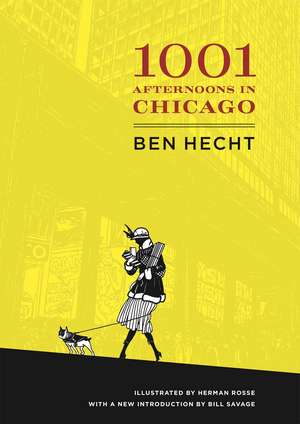A Thousand and One Afternoons in Chicago
Autor Ben Hecht Ilustrat de Herman Rosse Introducere de Bill Savageen Limba Engleză Paperback – iul 2009
In 1921, Ben Hecht wrote a column for the Chicago Daily News that his editor called “journalism extraordinary; journalism that invaded the realm of literature.” Hecht’s collection of sixty-four of these pieces, illustrated with striking pen drawings by Herman Rosse, is a timeless caricature of urban American life in the jazz age, updated with a new Introduction for the twenty-first century. From the glittering opulence of Michigan Avenue to the darkest ruminations of an escaped convict, from captains of industry to immigrant day laborers, Hecht captures 1920s Chicago in all its furor, intensity, and absurdity.
“The hardboiled audacity and wit that became Hecht’s signature as Hollywood’s most celebrated screen-writer are conspicuous in these vignettes. Most of them are comic and sardonic, some strike muted tragic or somber atmospheric notes. . . . The best are timeless character sketches that have taken on an added interest as shards of social history.”—L. S. Klepp, Voice Literary Supplement| Toate formatele și edițiile | Preț | Express |
|---|---|---|
| Paperback (3) | 69.73 lei 3-5 săpt. | |
| CREATESPACE – | 69.73 lei 3-5 săpt. | |
| University of Chicago Press – iul 2009 | 91.49 lei 3-5 săpt. | +17.45 lei 7-13 zile |
| – | 118.69 lei 3-5 săpt. |
Preț: 91.49 lei
Nou
Puncte Express: 137
Preț estimativ în valută:
17.51€ • 19.08$ • 14.75£
17.51€ • 19.08$ • 14.75£
Carte disponibilă
Livrare economică 02-16 aprilie
Livrare express 19-25 martie pentru 27.44 lei
Preluare comenzi: 021 569.72.76
Specificații
ISBN-13: 9780226322742
ISBN-10: 0226322742
Pagini: 296
Ilustrații: b&w line drawings throughout
Dimensiuni: 168 x 248 x 20 mm
Greutate: 0.45 kg
Editura: University of Chicago Press
Colecția University of Chicago Press
ISBN-10: 0226322742
Pagini: 296
Ilustrații: b&w line drawings throughout
Dimensiuni: 168 x 248 x 20 mm
Greutate: 0.45 kg
Editura: University of Chicago Press
Colecția University of Chicago Press
Notă biografică
Ben Hecht (1894–1964) was a reporter and columnist for the Chicago Daily Journal and the Chicago Daily News as well as a playwright, novelist, short story writer, and scriptwriter.
Cuprins
A Self-Made Man
An Iowa Humoresque
An Old Audience Speaks
Clocks and Owl Cars
Confessions
Coral, Amber and Jade
Coeur De Lion and The Soup and Fish
Dapper Pete and The Sucker Play
Dead Warrior
Don Quixote and His Last Windmill
"Fa'n Ta Mig!"
Fanny
Fantastic Lollypops
Fog Patterns
Grass Figures
Ill-Humoresque
Jazz Band Impressions
Letters
Meditation in E Minor
Michigan Avenue
Mishkin's Minyon
Mottka
Mr. Winkelberg
Mrs. Rodjezke's Last Job
Mrs. Sardotopolis' Evening Off
Night Diary
Nirvana
Notes For a Tragedy
On A Day Like This
Ornaments
Pandora's Box
Pitzela's Son
Queen Bess' Feast
Ripples
Satraps At Play
Schopenhauer's Son
Sergt. Kuzick's Waterloo
Sociable Gamblers
Ten-Cent Wedding Rings
The Auctioneer's Wife
The Dagger Venus
The Exile
The Great Traveler
The Indestructible Masterpiece
The Lake
The Little Fop
The Man From Yesterday
The Man Hunt
The Man With a Question
The Mother
The Pig
The Snob
The Soul of Sing Lee
The Sybarite
The Tattooer
The Thing In The Dark
The Watch Fixer
The Way Home
Thumbnail Lotharios
Thumbs Up and Down
To Bert Williams
Vagabondia
Waterfront Fancies
Where The "Blues" Sound
World Conquerors
An Iowa Humoresque
An Old Audience Speaks
Clocks and Owl Cars
Confessions
Coral, Amber and Jade
Coeur De Lion and The Soup and Fish
Dapper Pete and The Sucker Play
Dead Warrior
Don Quixote and His Last Windmill
"Fa'n Ta Mig!"
Fanny
Fantastic Lollypops
Fog Patterns
Grass Figures
Ill-Humoresque
Jazz Band Impressions
Letters
Meditation in E Minor
Michigan Avenue
Mishkin's Minyon
Mottka
Mr. Winkelberg
Mrs. Rodjezke's Last Job
Mrs. Sardotopolis' Evening Off
Night Diary
Nirvana
Notes For a Tragedy
On A Day Like This
Ornaments
Pandora's Box
Pitzela's Son
Queen Bess' Feast
Ripples
Satraps At Play
Schopenhauer's Son
Sergt. Kuzick's Waterloo
Sociable Gamblers
Ten-Cent Wedding Rings
The Auctioneer's Wife
The Dagger Venus
The Exile
The Great Traveler
The Indestructible Masterpiece
The Lake
The Little Fop
The Man From Yesterday
The Man Hunt
The Man With a Question
The Mother
The Pig
The Snob
The Soul of Sing Lee
The Sybarite
The Tattooer
The Thing In The Dark
The Watch Fixer
The Way Home
Thumbnail Lotharios
Thumbs Up and Down
To Bert Williams
Vagabondia
Waterfront Fancies
Where The "Blues" Sound
World Conquerors
Recenzii
“The columns in 1,001 Afternoons inChicago are scruffy time capsules of an earlier Chicago, an era that is long gone but still recognizable to readers' imaginations. Michigan Avenue, Lake Michigan, street names such as Dearborn and Adams and LaSalle and Wabansia, places such as the Art Institute of Chicago—they're all here, sprinkled amid Hecht's nervous little haikus of urban life. He calls Chicago ‘a razzle-dazzle of dreams, tragedies, fantasies,’ and his tales capture gorgeous scraps of it, vivid vignettes starring businessmen and hobos and cops and socialites and janitors. . . . Thanks to Hecht, the Chicago of 1922 and the Chicago of 2009 bump into each other, shake hands, exchange greetings. Then, this being Chicago, they go for a drink and talk about old times. New ones too.”
"Hecht's youthful journalism remains both movving and dazzling. He sided with the scrappy underdog and was endlessly alert to the moods of the great city that was his subject. . . . Saul Bellow read this book while still in high school and would always remember it, maybe because Hecht's sketches, while sometimes gritty and violent in content, also present a quest for lyricism and hope."
